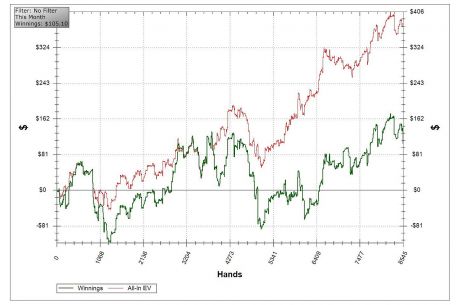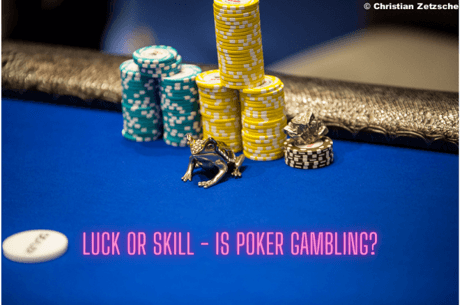Resolutions Aren’t Enough: Actively Work to Change Your Bad Poker Habits

I don’t do New Year’s resolutions. It’s not because I don’t believe in self-improvement — I most assuredly do. I just think that changing the calendar is a poor reason for changing your life. Nevertheless, this is the time of year that people talk about change, so let’s do it.
I’m a huge believer in people’s ability to change, to transform themselves. I’m a sucker for stories, novels, and movies about redemption, ones that center around a character getting a second chance and making good of it. Those will always get me right in the feels. Perhaps it’s because I know I have made substantial changes in my own life, and have ended up happier and healthier for it. And I’m not finished — one’s improvement should never be finished.
Don’t get me wrong — I’m not saying that radical change is easy. It’s not. It’s usually damn hard. But as Las Vegas magician Penn Jillette recently wrote, “Enjoy the difficulty. Everything you love in life, everything you’re proud of, you had to work for. That’s why you’re proud of it…. All the things that make life worth living take work.”
I believe that people fail at making changes for four main reasons.
Reasons Why People Fail To Make Changes
First, change requires a belief that doing so is necessary. Many people with genuine problems in their lives don’t believe they actually need to change, despite being aware of those problems. I used to watch the Dr. Phil show a lot. I was always stunned by the number of guests who would come on the show seeking help with a problem, but then would launch into a speech defending why they keep doing all the things that are causing their troubles. Dr. Phil’s response was always this great line: “How’s that working for you?” If something’s not working, you have to face that fact.
Second, change requires real motivation. Even when people recognize that something is a problem, they are insufficiently motivated to fix it. We tend to keep our habits, however dysfunctional they may be, because they’re easy and secure and a known quantity. Making different choices requires effort, uncertainty, and fear of what may happen. To make really fundamental changes requires a clear, unwavering decision that you want the future to be better than the past has been — and, frankly, most people aren’t willing to abandon the devil they know for an uncertain outcome, even if it’s likely to be better.
Third, change requires identifying why you keep making the same self-destructive choices. You’re not an idiot — you wouldn’t keep doing something that was causing only negative repercussions in your life. So you must be getting something powerfully positive out of it to have made it worth putting up with the adverse consequences all these years. You have to figure out what that reward is, and honestly confront whether you can either live without it or get it in some less problematic way.
Fourth, change requires a strategy. “Willpower” alone won’t cut it. If you want to quit smoking, you can’t leave packs of cigarettes around the house and count on willpower to resist picking them up every time you feel the urge. In fact, keeping cigarettes around is prima facie evidence that deep down you don’t actually plan to quit. You’re expecting to fail. You’re planning to fail.
Changing Your Poker Game for the Better
Of course all of this relates directly to poker. You have leaks in your game that either make you a long-term losing player or less of a winning player than you could be. How do I know that? Because everybody does.
I can’t identify your leaks for you. Maybe you play too many starting hands, or chase unprofitable draws, or distract yourself with electronic games and communications instead of studying the other players. Maybe you make bad calls because you’re morbidly afraid of being bluffed, or drink when you play, or choose bad games. Or maybe you play when you’re too tired to think straight, or start gambling more recklessly when you’re down in an effort to get even for the day, or play big pots from out of position, or give your opponents free information by showing your cards when you don’t have to, or fall victim to a thousand other common faults I could name.
The first step in changing a dysfunctional pattern is to identify a problem, and admit that it is a problem. Maybe you need a professional coach to help you, or a trusted friend who can watch you play for a while and see what issues need fixing.
Then you need to figure out why you’re doing it. What reward have you been getting from this behavior pattern that has made it worth the money it has been costing you?
In poker, the perverse reward that players trade for greater profits often involves ego. You want the other players to recognize that you’re a good, smart player. This leads you to show a successful bluff or a difficult fold, thus leaking information. It leads you to make bad calls because you find getting bluffed humiliating. It leads you to show off your poker knowledge by spouting win percentages in all-in situations, or discussing poker strategy at the table. It leads you unprofitably to target a player who put a bad beat on you, in order to soothe the pain.
Finally, you need to devise a strategy for change. It’s not enough to just say, “I won’t do that anymore.” That doesn’t work for poker leaks any more than it does for, say, stopping smoking by saying “I just won’t smoke anymore.” You need to develop a more tangible plan to help make the needed change actually happen.
Some examples:
- If your problem is that you reflexively rebuy after a big loss, and then usually lose that buy-in, too, your strategy might be to carry with you only enough cash for one or two buy-ins. Or maybe it would be that you’ll resolve always to take a walk after being felted, giving yourself time to decide whether the game is good enough to warrant continued play, and whether you’re psychologically and emotionally fit to play your A-game.
- If your problem is that while at the table you succumb to playing Candy Crush, or chatting on Twitter, or constantly rechecking sports scores, your strategy might be to give yourself a designated 10 minutes away from the poker game every hour to do those things, as a reward for turning your phone off (it does have an off switch, you know), and paying diligent attention the other 50 minutes.
- If your problem is that you can’t resist set-mining, no matter what your position is, with any stack sizes, and without regard to whether your opponents are ones who will pay off with lesser hands, then your strategy might need to be a rigid set of criteria under which you will play small pocket pairs. You can find such advice in any basic poker strategy book.
Nancy Reagan was only half-right in saying that the answer to the drug problem was “Just say no.” That’s fine for those who are not already addicted, but by itself it’s basically worthless advice for those whose lives now revolve around getting high. Deeply entrenched habits are hard to break — let’s not kid ourselves about that.
But change is always possible, even when it’s difficult. That’s as true for poker as for life generally.
So find something in your game that’s a problem. Name it. Own it. Figure out why you do it. Identify what motivates you to want to fix it. Devise a specific strategy to make different choices when your problem situation arises. Decide how you will make objective assessment of your success with the strategy, so that you can adjust it if necessary. Then go do it.
Or you can just keep playing the way you’ve always played, if you think that’s good enough. The choice is yours.
Robert Woolley lives in Asheville, NC. He spent several years in Las Vegas and chronicled his life in poker on the “Poker Grump” blog.
Want to stay atop all the latest in the poker world? If so, make sure to get PokerNews updates on your social media outlets. Follow us on Twitter and find us on both Facebook and Google+!









